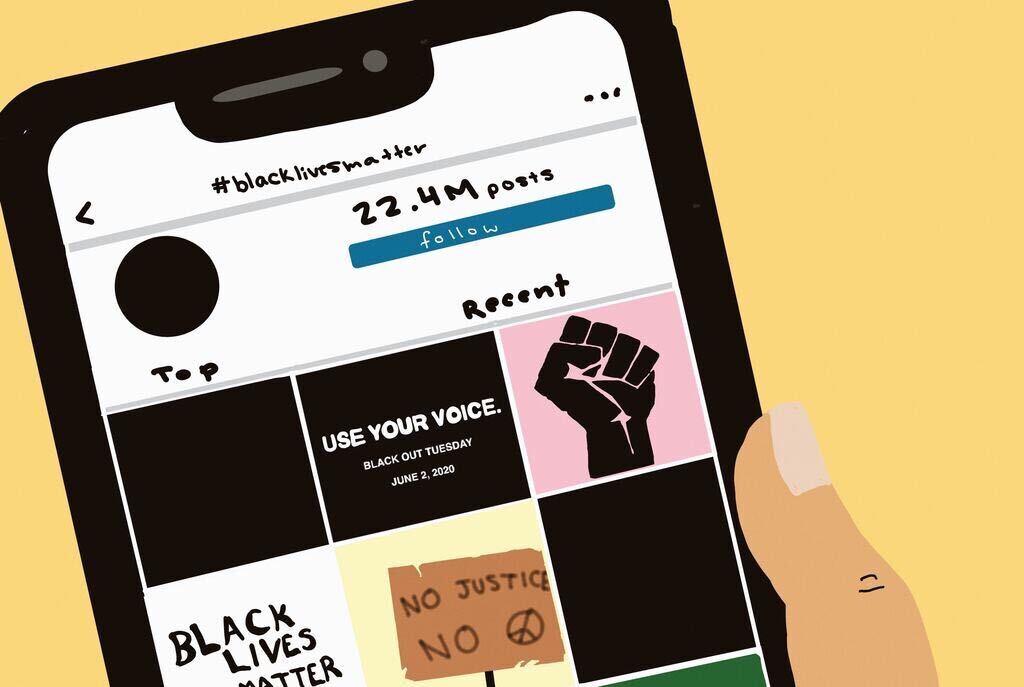George Floyd’s horrific murder has been seen all over the world, and has sparked rightful outrage. This is by far not the first time that a Black person has been killed and brutalized by the police. However, this is the first time where the response on social media has been so strong.
My timeline has been flooded with Martin Luther King Jr. quotes, #BlackLivesMatter and chain posts stating activists’ beliefs for the past few weeks. Many times before, from the death of Trayvon Martin to Breonna Taylor, these supposed white and non-Black allies have remained silent. Why do they care now?
I do think that these posts and this sense of solidarity can be a great step in the right direction. People who were silent before are now realizing the power of their voices and that they need to step up. Awareness is a great thing, and while Instagram is inherently performative, social media can be a powerful tool to spread important information. But when the movement is seen as a trend, that is damaging, as it implies that it will taper off. This is not a trend, but rather momentum we all need to build off of.
The other part of this sudden influx of posts that can be harmful to the movement is people viewing social media as a solution rather than a start.
Performative activism is when people are more worried about how others view them than they are about the actual matter at hand. When people care more about being seen as not racist instead of actually caring about racism, that’s a problem in itself. Or, when people are posting #BlackoutTuesday in an effort to absolve them of guilt and discomfort, that is a problem.
At one point, #BlackoutTuesday had 19 million posts, while the petition to get the officer arrested for George Floyd’s murder only had 11 million signatures. People need to realize not only the amount of power their voices hold, but also the potential for making change through taking action. There are so many ways that change can be done in a way that is not just superficial like protests, donations, petitions and education.
The phrase “silence is complicit” has been plastered all over social media, and people do not want to be remembered as being on the wrong side of history. Many are hopping on the Black Lives Matter movement because it is now a socially acceptable thing to do. But the institutional and systemic racism in our country is so ingrained in our culture, and posting a black square and having a Black friend does not make you “not racist.”
Let me be clear: Black people dying at the hands of the people who are supposed to protect us should make you uncomfortable. People do not want to sit with that discomfort and they would rather have a quick fix of reposting a story to display themselves as “non-racist”. This urge to be seen as non-racist builds many problems, and the fake solution of performative activism allows them the privilege to not have to look inwards.
We all have implicit biases within ourselves, and we need to correct ourselves. We all unconsciously hold certain assumptions and stereotypes about different groups of people that can be harmful. When I see people take part in performative activism who I have known to have been racist, say the N-word or excuse their friends’ behaviors, it makes me feel frustrated and uncomfortable. Yes, they can post on social media, that’s great. But they should be realizing their own internalized biases. To me it seems that they care more about their social standing than the injustices and oppression that the black community faces.Most people do not view themselves as racist, and performative activism gives people the easy way out of reflecting and amending these beliefs.
People need to have these conversations with themselves and with the people around them, and not only with those that agree with them. If people stop being scared of being called a racist, and instead educate themselves and work on being actively anti-racist, so much more change can be made.
Black people have been solely carrying this movement along with the trauma and fear that this country places upon them. Performative activism does not help, and can actually be damaging; people should change their character rather than change their Instagram stories. We all have to do more for the Black community, and not for praise, but because what’s happening should make people enraged.














































